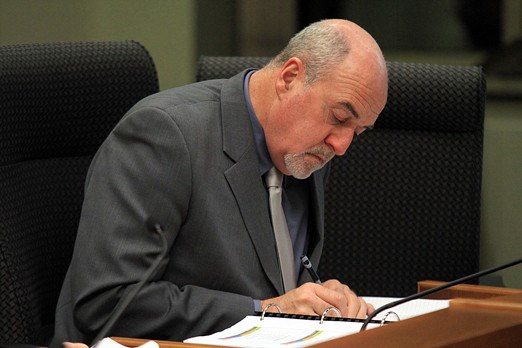Based on the city’s preliminary budget, the average Thunder Bay homeowner can expect to pay about $40 more a year in municipal taxes in 2011.
However, increased water and wastewater increases of 14.3 per cent will up the added costs to the average residential rate payer to about $137.28 a year. This works out to about $11.44 more a month taxpayers can expect to pay in 2011 should the budget be approved as is.
Homeowners using 200 cubic metres of water a year can expect to pay an extra $55.34 for water, or about $4.61 a month, and $41.51, or $3.46 a month, for wastewater services.
City manager Tim Commisso called it a fiscally responsible budget that takes future needs into consideration to eliminate surprises down the road.
“Obviously the big impact is the water rate, but it’s really tied to a long-term plan of how we maintain our water and our wastewater infrastructure in a sustainable way and reflects our infrastructure meets the legislation that’s in place,” Commisso said
That doesn’t mean it won’t have an impact, said Coun. Rebecca Johnson, speaking with media before the meeting began.
“I’ve told my family to cut back on their water usage, because I’m not paying for it,” Johnson said.
The municipal tax rate is actually projected to drop by 0.26 per cent, or $28, but ratepayers will have to contribute $22 as their share of the $1.5-million enhanced infrastructure renewal fund – which council has yet to officially approve – and $46 more due to increased assessment of their property. The education tax increase, set by the province, is not yet known, so city officials have listed it as a zero per cent increase
The projections are based on a home assessed at $126,793 in 2011, the city average.
Carol Busch, Thunder Bay’s manager of finance, told council on Tuesday that city administration had set a zero per cent municipal tax rate increase target when budget planning began, which meant finding efficiencies.
However, the city had to ensure it found an additional $3.3 million in taxation revenue, which includes $300,000 more for the base operating budget, $1.5 million more to the Lakehead Region Conservation Authority and the aforementioned contribution to the infrastructure renewal fund.
“In order to achieve this target, the equivalent increase in the budgeted taxation revenue would be $0.6 million, meaning reductions from the 2010 long-term financial plan projections of between $0.8 million and $1.4 million would be required,” Busch said.
Mayor Keith Hobbs, who campaigned on a platform of cutting waste, questioned the need for the LRCA to dredge the Neebing flood way in 2011, but was told that based on the engineering report, the work is necessary to maintain the asset
Hobbs also questioned whether or not the city had too many employees
"It looks good that you've come in at zero per cent for each department, but have you looked at staff reductions at all?" he asked.
Commisso said the city does not make staffing decisions when budgets are being formulated, but on an ongoing basis during the year.
Not everything met with full council approval. McIntyre Coun. Trevor Giertuga was incensed at the decision to estimate the education tax change at zero per cent, when historically the province in recent years has come back much lower.
"How many years in a row have we seen a decrease in education taxes?" Giertuga asked.
The veteran councillor said past practices has shown those decreases are rarely, if ever, passed on to residential rate payers, and instead are usually used to decrease commercial tax rates.
Giertuga said it seems like administration's attitude suggests that once the residential tax rate is set, it's set in stone.
"It's like you're saying, 'The residents, they're already paying that. They know they're paying that, so we'll go back and shift it onto reductions in commercial/industrial, based on council's long-term tax ratio strategy, which I say we need to review again."
Council also got a look at preliminary financial projections between 2012 and 2016 based on inflation rates of two per cent and three per cent
Administration is predicting a 3.4 per cent tax levy increase in 2012 based on a two per cent inflation rate or 4.7 per cent should inflation hit three per cent. In 2016 the figures would be 2.8 per cent and four per cent.
Sign in or register
- Messages
- Post a Listing
- Your Listings
- Your Profile
- Your Subscriptions
- Your Likes
- Your Business
- Support Local News
- Payment History
Registered Users
Already have an account?
New Users
Create a free account.
